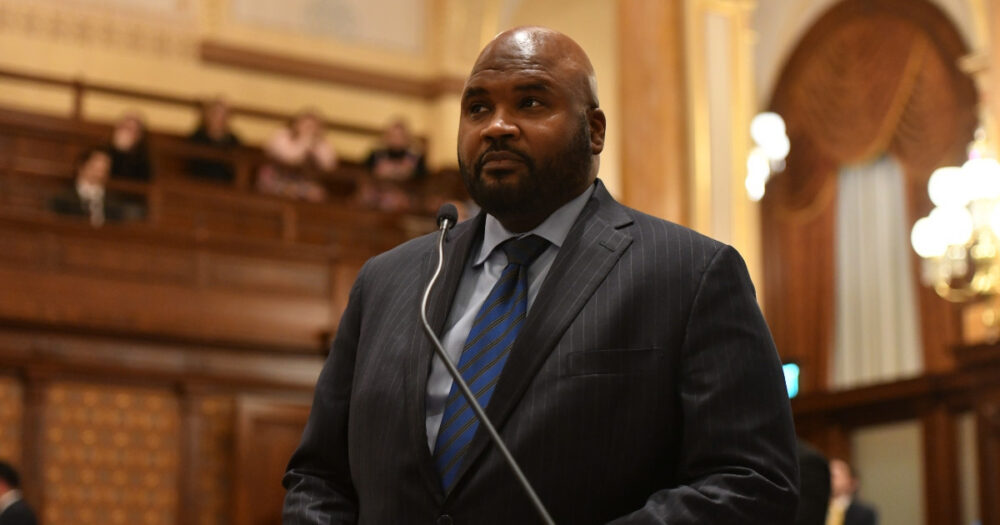Inflation slowed in April after seven months of relentless gains, a tentative sign that price increases may be peaking while still imposing a financial strain on American households.
Consumer prices jumped 8.3% last month from 12 months earlier, the Labor Department said Wednesday. That was below the 8.5% year-over-year surge in March, which was the highest since 1981. On a month-to-month basis, prices rose 0.3% from March to April, the smallest increase in eight months.
Advertisement
Still, Wednesday’s report contained some cautionary signs that inflation may be becoming more entrenched. Excluding the volatile food and energy categories, so-called core prices jumped 0.6% from March to April — twice the 0.3% rise from February to March. Those increases were fueled by spiking prices for airline tickets, hotel rooms and new cars. Apartment rental costs also continued to rise steadily.
The sharp price gains from March to April “make clear that there is still a long way to go before inflation returns to more acceptable levels,” said Eric Winograd, U.S. economist at asset manager AB.
Advertisement
Some individual categories of goods have skyrocketed over the past year. Grocery prices, for example, have shot up 10.8%, the largest year-over-year jump since 1980. The cost of a gallon of gas fell 6.1% in April but is still up nearly 44% from a year ago.
And so far in May, prices at the gas pump have reached new highs. Nationally, the average for a gallon of gas is at a record $4.40, according to AAA, though that figure isn’t adjusted for inflation. The high price of oil is the main reason. A barrel of U.S. benchmark crude sold for around $100 a barrel Tuesday. Gas had fallen to about $4.10 a gallon in April, after reaching $4.32 in March.
The escalation of consumer inflation has forced many Americans, particularly people with lower or fixed incomes, to reduce their spending on things like driving and grocery shopping. Among them is Patty Blackmon, who said she’s been driving to fewer of her grandchildren’s sports events since gas spiked to $5.89 in Las Vegas, where she lives.
To save money, Blackmon, 68, also hasn’t visited her hairdresser in 18 months. And she’s reconsidering her plan to drive this summer to visit relatives in Arkansas.
She was shocked recently, she said, to see a half-gallon of organic milk reach $6.
“Holy cow!” she thought. “How do parents give their kids milk?”
Blackmon has cut back on meat, and “a steak is almost out of the question.” Instead, she is eating more salads and canned soups.
Beyond the financial strain for households, inflation is posing a serious political problem for President Joe Biden and congressional Democrats in the midterm election season, with Republicans arguing that Biden’s $1.9 trillion financial support package last March overheated the economy by flooding it with stimulus checks, enhanced unemployment aid and child tax credit payments.
Advertisement
On Tuesday, Biden sought to take the initiative and declared inflation “the No. 1 problem facing families today” and “my top domestic priority.”
Biden blamed chronic supply chain snarls related to the swift economic rebound from the pandemic, as well as Russia’s invasion of Ukraine, for igniting inflation. He said his administration will help ease price increases by shrinking the government’s budget deficit and by fostering competition in industries, like meatpacking, that are dominated by a few industry giants.
Still, new disruptions overseas or other unforeseen problems could always send U.S. inflation back up to new highs. If the European Union decides, for example, to cut off Russian oil, gas prices in the United States would likely accelerate. China’s severe COVID lockdowns are worsening supply problems and hurting growth in the world’s second-biggest economy.
Jose Torres, a senior economist at Interactive Brokers, noted that China’s weakening economy has reduced demand for oil. If China eases its lockdowns later this year and if more people drive, world oil prices could go higher and further inflate gas prices in the U.S.
Previous signs that U.S. inflation might be peaking didn’t last. Price increases decelerated last August and September, suggesting at the time that higher inflation might be temporary, as many economists — and officials at the Federal Reserve — had suggested. But prices shot up again in October, prompting Fed Chair Jerome Powell to start shifting policy toward higher rates.
While food and energy have endured some the worst price spikes of the past year, analysts often monitor the core figure to get a sense of underlying inflation. Core inflation also typically rises more slowly than the overall price increases and can take longer to decline. Rents, for example, are rising at a historically fast pace, and there is little sign of that trend reversing anytime soon.
Advertisement
The unexpected persistence of high inflation has caused the Fed to embark on what may become its fastest series of interest rate increases in 33 years. Last week, the Fed raised its benchmark short-term rate by a half-point, its steepest increase in two decades. And Powell signaled that more such sharp rate hikes are coming.
The Powell Fed is seeking to pull off the notoriously difficult — and risky — task of cooling the economy enough to slow inflation without causing a recession. Economists say such an outcome is possible but unlikely with inflation this high.
In the meantime, by some measures Americans’ wages are rising at the fastest pace in 20 years. Their higher pay enables more people to at least partly keep up with higher prices. But employers typically respond by charging customers more to cover their higher labor costs, which, in turn, heightens inflationary pressures.
Last Friday’s jobs report for April included data on hourly pay that suggested that wage gains were slowing, which, if it continues, could help ease inflation this year.






